- Home
- Naguib Mahfouz
The Coffeehouse Page 2
The Coffeehouse Read online
Page 2
“My father can ride any train in the country without a ticket,” boasted Ismail. “And no one can make cake and meat pies like my mother!”
His four sisters were born before him. Their education had left them just barely literate. They were locked up in the house to prepare them to be housewives. Their looks were middling. In fact, Ismail Qadri was much comelier, yet they married before even turning sixteen, all of them to petty officials in the railways like their father. For the sake of these marriages, their father had sold the only house he owned, in Bab al-Sha‘riya.
“As for you, your future is in your own hands,” Qadri Effendi Suleiman told his son.
Ismail did not disappoint his father, for he outshone us all at school without any dispute. He studied, memorized, and excelled, never satisfied with either the praise of our teachers or with our amazement. Everyone agreed he was the champion in this field. He was brilliant, loving religion as Sadiq loved poetry, and fasting from the age of seven.
He never stopped imagining God in a majestic form whose grandeur had no limit.
He kept asking the teacher about Him until the instructor grew annoyed and ordered him just to submit and obey. Meanwhile, Ismail had all sorts of entertaining experiences.
“I’ve been growing onions, watering the crops, and gathering grapes and guava in our little garden,” he said. “And I’ve been hunting frogs to cut open their stomachs and see what’s inside.”
“Do you want to be a doctor?” asked Tahir.
“Maybe,” he said. “I don’t know yet.”
His reckless curiosity drove him to experiment with an operation on a young female servant’s hand, slicing open her palm. At this, his mother became so violently angry that she threatened to perform the same operation on his hand. He burst out crying, begging her not to do it. When his father returned from work and heard what he’d done, he struck him five times with his walking stick. Maybe this was one of the reasons that he later turned away from medicine. Among his most amusing stories were the ones about his visits to his sisters in other parts of the city: he would talk of Shubra and Rod al-Farag, al-Qubaysi and Sayyida Zeinab. His father invited him once for an outing in Luna Park in Heliopolis, and he went along. He grew madly infatuated the same way Tahir did with cinema. He was utterly beguiled by the rides there, like the train and the sliding boat. But the real glory of his childhood was simmering on his rooftop, where he raised rabbits and chickens, and kept a storeroom. In a disciplined manner, he brought the rabbits and chickens food and water, inspected the newborns and gathered up the hens’ eggs. In the rooftop room, at his command, clarified butter, whey, cheeses, and molasses were made. He also covered the wall bordering his rooftop—over which loomed the sky with its birds and stars—with drawings. The room gave him the chance to be alone sometimes. And he had an even more beautiful opportunity when he received the daughters of relatives and neighbors. From that long-ago moment he began his experimentation with religion and with sex. At one instant he would pray, and play husband and wife the next.
His mother was convinced of his piety. She never doubted his seriousness.
“Don’t you fear God?” Sadiq Safwan asked him.
He laughed, and—embarrassed—he did not reply. That boy was ahead of us in everything.
We sat on the orchard grass under the date palm, Hamada and Tahir in shirts with short pants, Sadiq and Ismail garbed in gallabiyas. We took great care with our appearance. Hamada and Tahir kept their long hair neatly combed, while Sadiq and Ismail had theirs cropped short. Under the sway of cinema we built up our bodies with games and sports. We took as our highest model the tough-guy hero of the film, be it Tom Mix, William S. Hart, or Douglas Fairbanks Sr. Each of us claimed that his father was a hero, making up stories to prove it: he overpowered a thief that he caught in the house, or beat up a thug who stopped people on the road. Sometimes kids in the streets would pick fights with us, and we, fired by our imaginations, would take up the challenge. Yet the result always dashed our hopes, for those boys fought with head-butts and clogs. When it came to affection, ours for each other was pure and unadulterated. In time we divided into two groups over cinema—one for Le Machiste and the other for the Phantom. The talk would turn furious between us as we lined up to take sides against each other. Still, not one of us uttered an ugly word or made a provocative gesture. Our group incited envy in the hearts of our peers.
In 1918, we went to take the entrance exam for the Husseiniya School, as we had finished our elementary studies and reached the age of nine. We waited for the results on the school playground, hoping that misfortune would not split us apart. God be praised, all of us passed. Ismail Qadri did extremely well, while Sadiq and Hamada got by okay; Tahir made it by dint of being the son of Dr. Ubayd al-Armalawi. Thanks to our all being close to the same age, we were all in the same grade—the fourth primary—to which the youngest pupils belonged. New textbooks were given to us, and we carried them—all of them—back home to delight the eyes of our families. Ismail joined the Young Lions football team, then quit it, despairing at his lack of skill. Sadiq tried the drama troupe, but quickly dropped out. Meanwhile, Hamada wanted to be a boy scout, but his parents wouldn’t approve. We would meet in the playground for a hasty chat, but outside of school we restricted our gatherings to Thursdays and Fridays. On Thursdays we would go to the Bellevue Cinema, and spend Friday mornings—weather permitting—at the base of the date palm, thus saving our analytical discussions for their former place. Among us, only Ismail Qadri Suleiman felt the urge to excel.
“I heard Papa talking about the three men who went to the English to demand independence for Egypt!” Hamada Yusri al-Halawani confided to us one day.
“That is, for the English to leave Egypt!” he added.
Perhaps we knew no more about the English than that they were our neighbors in Abbasiya, where they kept their barracks. We often saw their soldiers on the trams. For the first time, our families throbbed with this discussion, and the reality arrived at our school itself, with news of the exile inflicted on our leaders. The whole school gathered, all the generations and pupils of various ages, arrayed in different units. We were the youngest group, yet you could find students in the fourth form that already had mustaches! One morning, a group of students sporting hair on their upper lips stepped out of the ranks to shout with thunderous voices, “Strike!” This produced such pandemonium that the overseer of the fourth primary form dismissed us to the care of our professors, and implored the revolutionaries to excuse us from the strike because of our age. Our playground roared with impassioned speeches. Then the pupils surged outside in a stormy demonstration, their first practical lesson in patriotism, which left zeal in our hearts despite our ignorance of what was going on. In our homes we heard echoes of what had happened outside reverberating hotly: it was the first time that fathers and sons met in one burning emotion. Even our mothers were paying attention and were agitated by the swirling events. The December wind that carried tidings of the demonstrations to our houses may have been cold, yet we found it not only warm, but scorching. The deaths of the martyrs were recited like legends. The English patrols ran through our neighborhoods on lorries bristling with weapons, while the crowds’ slogans rolled toward us from Husseiniya in the south and Wayliya in the north: “Saad, long live Saad! Total independence or death by violence!”
The news was broadcast in our homes, “Public transport has come to a halt; demonstrations everywhere; the peasants are on the warpath.”
The earth trembled unexpectedly, not wanting to calm down. Emotions surged within us, transforming us into new beings entirely. The zeal swept away Sadiq, Ismail, and Hamada—nor was Tahir lacking in it either. Leaflets were handed out, stoking the blazing fire. Something great happened in our quarter when Yusri Pasha al-Halawani was arrested marching in solidarity at the head of the heroes, and we looked at Hamada with admiration.
“Our house is sad, but we are honored,” he told us. “If that had happened at any other time, my mother would have died of worry.”
But Tahir’s relative coolness upset us.
“What about your father?” we asked him.
“Papa is an official,” he answered, “one of the ruler’s men. Even so, he is with the Revolution, but he. …”
“But he what?” Hamada pressed him.
“But he has a private opinion about Saad! He doesn’t like his past.”
Our faces grimaced in protest when Tahir rebuked Sadiq: “Your relative, Raafat Pasha al-Zayn, is one of the ruler’s men, too.”
“That’s his own position—he’s all by himself,” Sadiq rejoined. “We have nothing to do with it.”
The fanaticism, the killing and its victims laid a pall over our daily lives, as our little world was enclosed between house and school. And at school, Hamada became a much-loved personality as the son of the imprisoned hero, while each instructor did not hesitate to bestow upon us a nationalist upbringing, regardless of the risk to their own safety and future. Thanks to these great teachers, we learned what had been hidden from us in history since the Urabi revolution. We learned of Saad as a model of power, struggle, intelligence, and righteousness. We grew intoxicated on what we heard, and the spirit of patriotism sprouted within us—which has not been uprooted even today. The country savored its first victory with the release of the exiled leaders—then came the most amazing day when Saad himself returned. Yusri Pasha al-Halawani was freed along with them, and the masses of Abbasiya, Husseiniya, and Wayliya greeted him as he came back to his palace in Hospital Square. Thanks to our friend Hamada’s retelling, we were able to visualize the celebration of Saad’s homecoming that he witnessed from the place his family had reserved in the Continental Hotel. And we followed the events as a sudden break betwe
en Saad and Adly split the revolution’s unity. We found Tahir on one side and the rest of us on another, just as we had disagreed before over Le Machiste and the Phantom. But we—despite the division among the leaders—maintained our mutual affection, and our friendship survived.
While the nation was passing from trouble to trouble, and Saad was sent to his second exile, we all reached puberty at nearly the same time. A revolution exploded inside our bodies, warning of impending danger. Ismail Qadri was the only one of us who handled it boldly, taking his sexual daring from the roof of his house to the forest of Indian fig trees in Uncle Ibrahim’s field. Meanwhile, Sadiq, Hamada, and Tahir endured the torment of desire in an innocent state of ignorance.
Sadiq Safwan lived in a house blessed with love, harmony, and a stable marital life. As an only child, he was favored with every sort of care—but his adolescent awakening was considered a secret that must be avoided. At puberty, with neither a teacher nor a helper, he abandoned his piety.
“Marriage is the only cure for this,” he once told us. “But when will that come?”
Sadiq loved his parents—he was not afraid of them: Tahir Ubayd was like him in this. Safwan Effendi al-Nadi began to escort his son to Friday prayers at the Sidi al-Kurdi mosque.
“Didn’t your father’s mustache poke those praying on either side of him in the eye?” Tahir teased Sadiq after we’d waited for his return.
Sadiq’s father never stopped pushing him to work hard and settle into the right position, for only that would save him from a future of poverty.
“I want to be rich like Raafat Pasha,” Sadiq vowed to him.
“Wealth is in God’s hand,” his father replied. “Your thinking is wrong.”
“Didn’t he start out on a level close to our own?”
“Don’t waste your energy on empty dreams,” Safwan Effendi retorted angrily.
“Everyone loves riches,” said Ismail Qadri. “But love is one thing, and labor is another.”
Raafat Pasha’s palace, its people and its splendor, were firmly ensconced in Sadiq Safwan’s mind. Their modesty charmed him more than anything in existence. And Amira—despite their difference in age, and even though she was about to get married—no doubt stirred his heart from its innocence. In one way or another, she seduced everyone.
Hamada, the hero’s son, kept on growing taller and sleeker. He gleamed like one born into an aristocratic family. He spoke with deliberation, plucking his words from a polished lexicon. He would have held himself aloof from the world in pride—as Mahmud (his actual name, Hamada being his nickname), the son of Raafat Pasha—if he hadn’t fallen into our friendship. He never pulled back from this common side for the whole of his life. His sorrow grew worse when his sister Afkar married and moved away from home—she was his only friend on hostile terrain. His brother Tawfiq was favored of status and vague of aspiration. They had lukewarm feelings for each other.
One day Tawfiq told him, “I don’t approve of your friends.”
“I approve of them—that’s all that matters.”
Tawfiq sought to stir up the issue with their parents in his presence.
“A man must choose the right kind of companions,” he told the pasha.
“All my friends are from the same class to which our leader Saad belongs,” Hamada answered him.
The pasha laughed and said nothing.
“Papa wants me to devote my life to the factory,” Hamada told us. “Nothing is more annoying than when he urges me to imitate my brother Tawfiq. Yet I do owe his library the happiest hours of my life.”
“No doubt your father is a really great reader,” remarked Tahir.
“Maybe when he was young,” said Hamada. “But nowadays he only relaxes on Sundays.”
“What about your mother?”
“She reads newspapers and magazines, and lives in a social whirl.”
“So long as you find men like al-Halawani and al-Zayn,” said Sadiq Safwan, “then riches are not a pipe dream!”
Then he asked Hamada, “Don’t you want to be rich like your father?”
“Of course, I love money,” he chuckled. “But I hate the factory.”
“Tawfiq will take your father’s place after a long while, and become head of the family,” said Sadiq. “And what about you? What do you want to be?”
Pausing in confusion, Hamada replied, “I don’t know. I still don’t love work, but I do love living.”
“Tahir loves poetry,” commented Ismail.
“Life is more beautiful than poetry, or the factory,” Hamada said vehemently.
Reflecting for a long time on his elegant appearance, Tahir asked him out of the blue, “Do your parents ever quarrel with each other?”
Taken aback, Hamada asked in return, “What is the meaning of your question?”
“I truly want to know.”
“Life is never free of conflict,” said Hamada.
“How do arguments between married couples go in your class?”
“Anger flares, they knit their brows,” said Hamada, smiling. “My father says, ‘Madam, such-and-such is unsuitable,’ and Mama says, ‘Pasha, I will not hear of that.’ It’s all ‘Madam’ and ‘Pasha.’”
“Hasn’t he ever insulted her by saying, ‘Girl, this or that’?” asked Tahir.
“That is your way and not ours, good sir,” answered Hamada.
He then told us about his father’s greed and his mother’s dissipation.
“Papa isn’t miserly as Mama sometimes likes to accuse him of being, but he doesn’t like to waste a penny without good reason. Mama thinks that good reason includes whatever appeals to her from the goods at Cicurel, including antiques and the food and beverages that she serves at her banquets, as well as gifts for special occasions. She spared no expense to provide my sister Afkar with imported furniture and jewelry. And for the wedding night, she hired Munira al-Mahdiya and Salih Abd al-Hay—the stars of the musical world—to sing.”
Guffawing, Hamada added, “Papa told Mama, ‘Madam, you are nothing more than a torpedo boat for the British fleet!’”
Nonetheless, the pasha had donated twenty thousand Egyptian pounds to the Wafd. Then he stepped forward at the proper time to take the place of the exiled leaders, and was arrested, joining the line of heroes. He would become a member for our beautiful, vanguard quarter in parliament, and his palace a steady base for the Wafd. But despite all this, Hamada did not match our friend Ismail Qadri either in zeal or loyalty to the Wafd. I told myself that Hamada had not inherited his father’s singular virtue in work and holy war. He had acquired his solid build, large head, and lofty brow, a look made for administration and command. But he lacked the fire for either.
Tahir Ubayd belonged to the same class as Hamada, but with his tendency to put on weight and his simple, easy-going attitude, he seemed like one of us. Beneath the date palm we heard his first poetry. Lovingly dutiful to his mother, he set about to learn French, wandering from corner to corner in the palace’s great library.
“I’m being pushed,” he sometimes told us anxiously. “Woe to me if I don’t become an outstanding doctor!”
He was openly bewitched by his two sisters’ friends. Finally, Ismail Qadri asked him, “Doesn’t your palace have a terrace on the roof?”
“No terrace on the roof and no forest of figs!” he laughed.
Despite having grown up in a half-European villa, he had a vulgar look and attitude. How did he escape shaping by the pasha and his lady? In his parents’ eyes, we were responsible for his fall, but he was, in fact, voracious by nature. Not only did he instill in us a love for snacking—a passion for head meat, horse beans, falafel, sausages stuffed with rice and spices, liver, pickled eggplant; sweet couscous, sticky deep-fried treats soaked in syrup, pastries made with flour, clarified butter, and sugar—he also offered them to us using the slang of the streets and alleys, studding his verses with a rebellious vocabulary. We set out on the path to culture with stories written and recited, but he began with the three great poets: Ahmad Shawqi, Hafiz Ibrahim, and Khalil Mutran. And despite the criticism and heavy instruction, he considered primary school the happiest time of his life when it came to his relationship with his parents. He made them happy by learning French, and by memorizing and composing poems. The pasha, though, considered all of this to be at the expense of the profession he had chosen for his son.

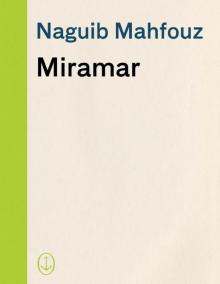 Miramar
Miramar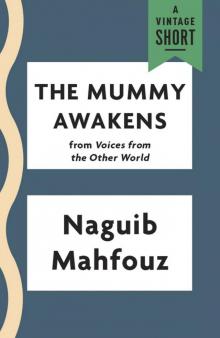 The Mummy Awakens
The Mummy Awakens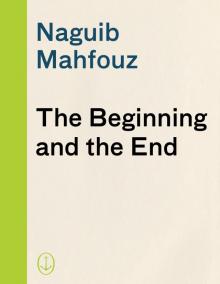 The Beginning and the End
The Beginning and the End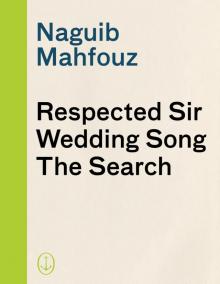 Respected Sir, Wedding Song, the Search
Respected Sir, Wedding Song, the Search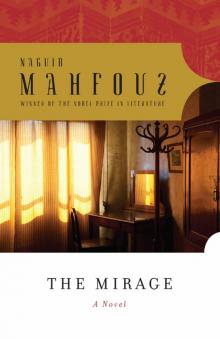 The Mirage
The Mirage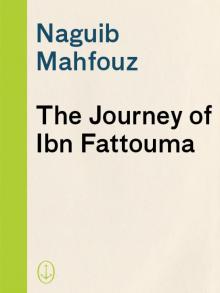 Novels by Naguib Mahfouz
Novels by Naguib Mahfouz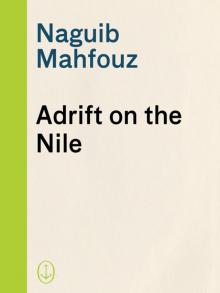 Adrift on the Nile
Adrift on the Nile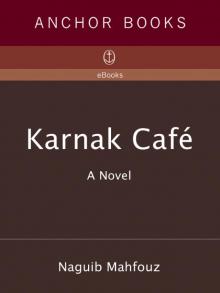 Karnak Café
Karnak Café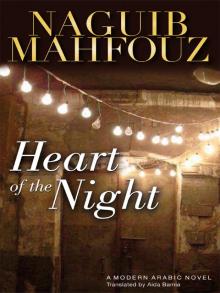 Heart of the Night
Heart of the Night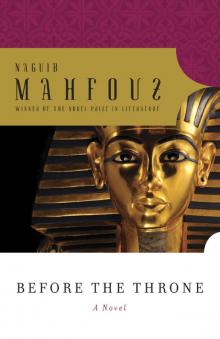 Before the Throne
Before the Throne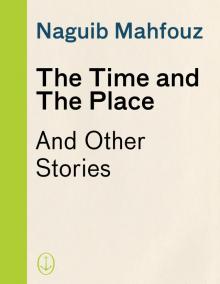 The Time and the Place: And Other Stories
The Time and the Place: And Other Stories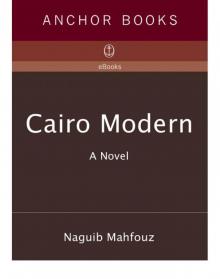 Cairo Modern
Cairo Modern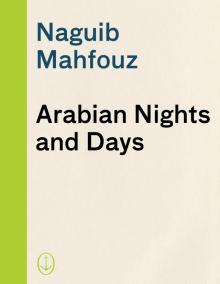 Arabian Nights and Days
Arabian Nights and Days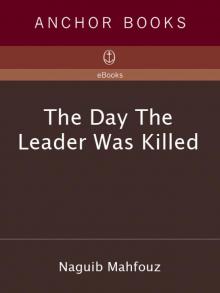 The Day the Leader Was Killed
The Day the Leader Was Killed Morning and Evening Talk
Morning and Evening Talk Three Novels of Ancient Egypt Khufu's Wisdom
Three Novels of Ancient Egypt Khufu's Wisdom Akhenaten: Dweller in Truth
Akhenaten: Dweller in Truth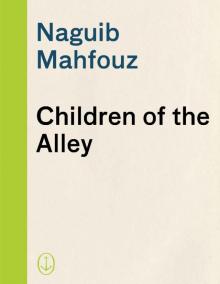 Children of the Alley
Children of the Alley Voices From the Other World
Voices From the Other World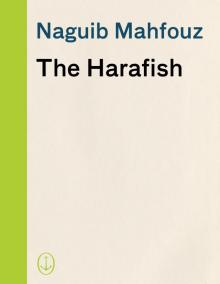 The Harafish
The Harafish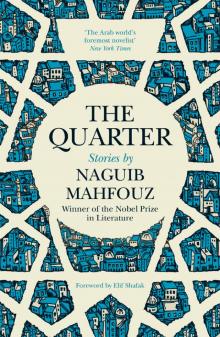 The Quarter
The Quarter The Seventh Heaven: Supernatural Tales
The Seventh Heaven: Supernatural Tales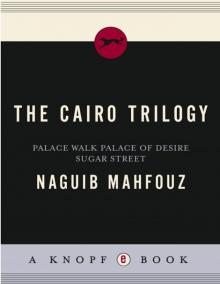 The Cairo Trilogy: Palace Walk, Palace of Desire, Sugar Street
The Cairo Trilogy: Palace Walk, Palace of Desire, Sugar Street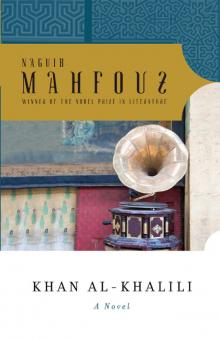 Khan Al-Khalili
Khan Al-Khalili Three Novels of Ancient Egypt Khufu's Wisdom, Rhadopis of Nubia, Thebes at War
Three Novels of Ancient Egypt Khufu's Wisdom, Rhadopis of Nubia, Thebes at War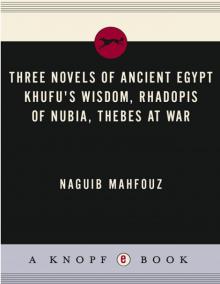 Three Novels of Ancient Egypt
Three Novels of Ancient Egypt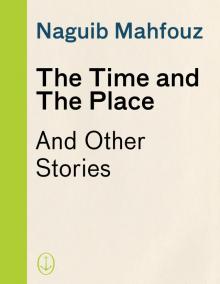 The Time and the Place
The Time and the Place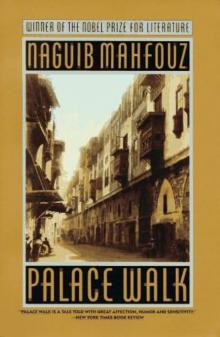 Palace Walk tct-1
Palace Walk tct-1 Akhenaten
Akhenaten The Seventh Heaven
The Seventh Heaven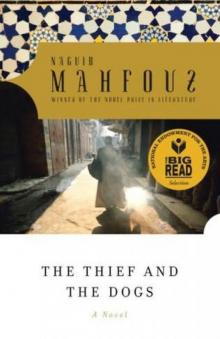 The Thief and the Dogs
The Thief and the Dogs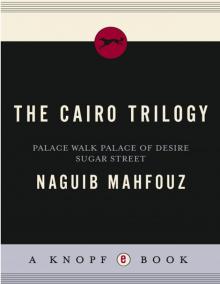 The Cairo Trilogy
The Cairo Trilogy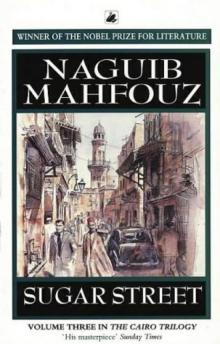 Sugar Street tct-3
Sugar Street tct-3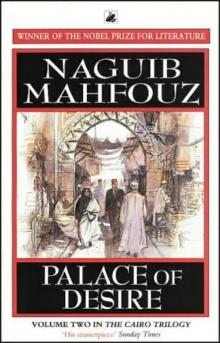 Palace of Desire tct-2
Palace of Desire tct-2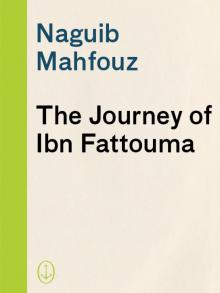 The Journey of Ibn Fattouma
The Journey of Ibn Fattouma